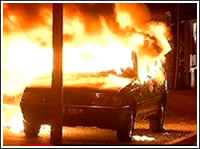 The fire that has burned thousands of cars every night for two weeks in the suburbs of several French cities is but the visible and violent sign of a structural problem: the exclusion and social discrimination inherent in the neoliberal economic model. Attempts to douse the flames with the water of police interventions in the affected areas and closing the frontiers of Europe to immigration is neither a fair nor an effective solution. If we do not change the socio-economic conditions that underpin this structural blaze, it will break out again someday.
The fire that has burned thousands of cars every night for two weeks in the suburbs of several French cities is but the visible and violent sign of a structural problem: the exclusion and social discrimination inherent in the neoliberal economic model. Attempts to douse the flames with the water of police interventions in the affected areas and closing the frontiers of Europe to immigration is neither a fair nor an effective solution. If we do not change the socio-economic conditions that underpin this structural blaze, it will break out again someday.
The solidarity socio-economy is one of the paths that can be taken to encourage the long term improvement of the socio-economic conditions of the victims of social exclusion in both the North and South. Why? Because fair trade organizations, solidarity finance institutions and all the other solidarity socio-economy initiatives are concrete economic instruments that allow thousands of people to improve their living conditions and become actors in their own development.
The solidarity economy is a means of taking economic action in favour of social cohesion, by expressing and fighting for the recognition of socio-economic rights and access for the least advantaged members of society to employment, credit, consumption and housing, using the socio-economic innovations of civil society. But this is not the only role of the solidarity economy. It also aims to promote a new economic paradigm based on economic democracy and social justice. Faced with economic globalization and the increase in social inequalities in both North and South, the solidarity socio-economy’s primary challenge is to go beyond the stage of successful local initiatives to establish itself politically and economically as a promoter of solidarity-based and fairer economic behaviour and international regulations, as well as new levels of North-South solidarity.
This ambition, which has inspired the work of the Workgroup on Solidarity Socio-Economy (WSSE) since it began, explains the strategic importance of the two solidarity socio-economy meetings taking place shortly in Dakar:
- the WSSE annual internal seminar, from 19 to 21 November 2005, where around thirty of the most active WSSE participants will be sharing and discussing the fruits of their recent work in order to create a cross-cutting process of deliberation. This process is aimed at generating a shared vision of the sort of economy that we seek to promote, as well as the socio-economic indicators needed to do so;
- the 3rd International meeting on the Globalization of Solidarity, from 22 to 26 November 2005, where the Intercontinental Network for the Promotion of the Social Solidarity Economy (RIPESS) will be demonstrating that the solidarity socio-economy is a new development movement in itself, seeking its place within international civil society.
We hope that these two events will open up new avenues for hope and produce concrete proposals capable of tackling the structural blaze of socio-economic injustice!


